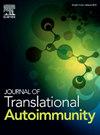Immune responses to infection and autoimmune diseases in the UK biobank
IF 3.6
Q2 IMMUNOLOGY
引用次数: 0
Abstract
Background
Infections may trigger autoimmunity, but large-scale studies on antibodies to infections and their associations with autoimmune diseases are limited. We aim to better understand the etiologic role of infection.
Methods
We analyzed 9429 UK Biobank participants for 45 antibody responses to 20 pathogens. Association between seropositivity and autoimmune diseases was assessed with logistic regression for prevalence and Cox regression for incidence, applying Bonferroni correction. 49 autoimmune diseases were ascertained via International Classification of Diseases codes and self-reported diagnoses, of which 14 were analyzed.
Results
At baseline, 671 (7.1 %, 58 % female) had at least one autoimmune disease. In males, HSV-1 seropositivity was linked to lower odds of rheumatic fever/rheumatic heart disease (odds ratio 0.29 [95 % CI 0.12–0.68]), at Bonferroni significance. At nominal significance (p < 0.05), eight associations were observed—positive: HHV-6B–type 1 diabetes, H. pylori–sarcoidosis, HPV-18–type 1 diabetes, JCV–psoriasis; inverse: T. gondii–celiac disease, H. pylori–Crohn’s disease, HSV-1–multiple sclerosis, HHV-7–rheumatoid arthritis. Of 8758 autoimmune disease-free individuals, 627 developed autoimmune diseases. In females, seropositivity to HPV-18 was associated with rheumatoid arthritis (hazard ratio 2.26 [95 % CI 1.34–3.82]), at Bonferroni significance. HRs for 3 nominal seropositivity/autoimmune disease associations (1 inverse, 2 positive) ranged from 0.42 [95 % CI 0.21–0.87] (HHV-6B/vasculitis) to 3.62 [95 % CI 1.29–10.12] (C. trachomatis/psoriasis) in both sexes.
Conclusions
This study examined cross-sectional and prospective associations between antibodies to infectious agents and autoimmune diseases. Inverse associations may suggest infections could train the immune system or reflect altered host immunity, while positive associations indicate potential autoimmune triggers. These findings enhance understanding of autoimmune disease etiology and provide a foundation for future mechanistic studies and hypothesis-driven research.
英国生物银行对感染和自身免疫性疾病的免疫反应
感染可能引发自身免疫,但对感染抗体及其与自身免疫性疾病的关联的大规模研究是有限的。我们的目标是更好地了解感染的病因学作用。方法对9429名UK Biobank参与者进行20种病原菌45种抗体应答分析。血清阳性与自身免疫性疾病之间的关系采用流行率的logistic回归和发生率的Cox回归进行评估,并应用Bonferroni校正。通过国际疾病分类代码和自我报告诊断确定了49种自身免疫性疾病,并对其中14种进行了分析。结果基线时,671例(7.1%,58%为女性)至少有一种自身免疫性疾病。在男性中,HSV-1血清阳性与风湿热/风湿性心脏病的发生率较低相关(优势比0.29 [95% CI 0.12-0.68]),具有Bonferroni显著性。在名义意义上(p < 0.05), 8个相关性观察到阳性:hhv - 6b型1型糖尿病,幽门螺杆菌结节病,hpv -18型1型糖尿病,jcv -牛皮癣;逆:弓形虫-乳糜泻,幽门螺杆菌-克罗恩病,单纯疱疹病毒-1多发性硬化,单纯疱疹病毒-7类风湿性关节炎。在8758名无自身免疫性疾病的个体中,627人患上了自身免疫性疾病。在女性中,HPV-18血清阳性与类风湿关节炎相关(危险比2.26 [95% CI 1.34-3.82]),具有Bonferroni显著性。3种名义血清阳性/自身免疫性疾病相关(1例阴性,2例阳性)的hr在两性中范围从0.42 [95% CI 0.21-0.87] (HHV-6B/血管炎)到3.62 [95% CI 1.29-10.12](沙眼衣原体/牛皮癣)。结论:本研究探讨了传染性病原体抗体与自身免疫性疾病之间的横断面和前瞻性关联。负相关可能表明感染可能训练免疫系统或反映宿主免疫改变,而正相关表明潜在的自身免疫触发因素。这些发现增强了对自身免疫性疾病病因学的理解,并为未来的机制研究和假设驱动的研究提供了基础。
本文章由计算机程序翻译,如有差异,请以英文原文为准。
求助全文
约1分钟内获得全文
求助全文
来源期刊

Journal of Translational Autoimmunity
Medicine-Immunology and Allergy
CiteScore
7.80
自引率
2.60%
发文量
33
审稿时长
55 days
 求助内容:
求助内容: 应助结果提醒方式:
应助结果提醒方式:


